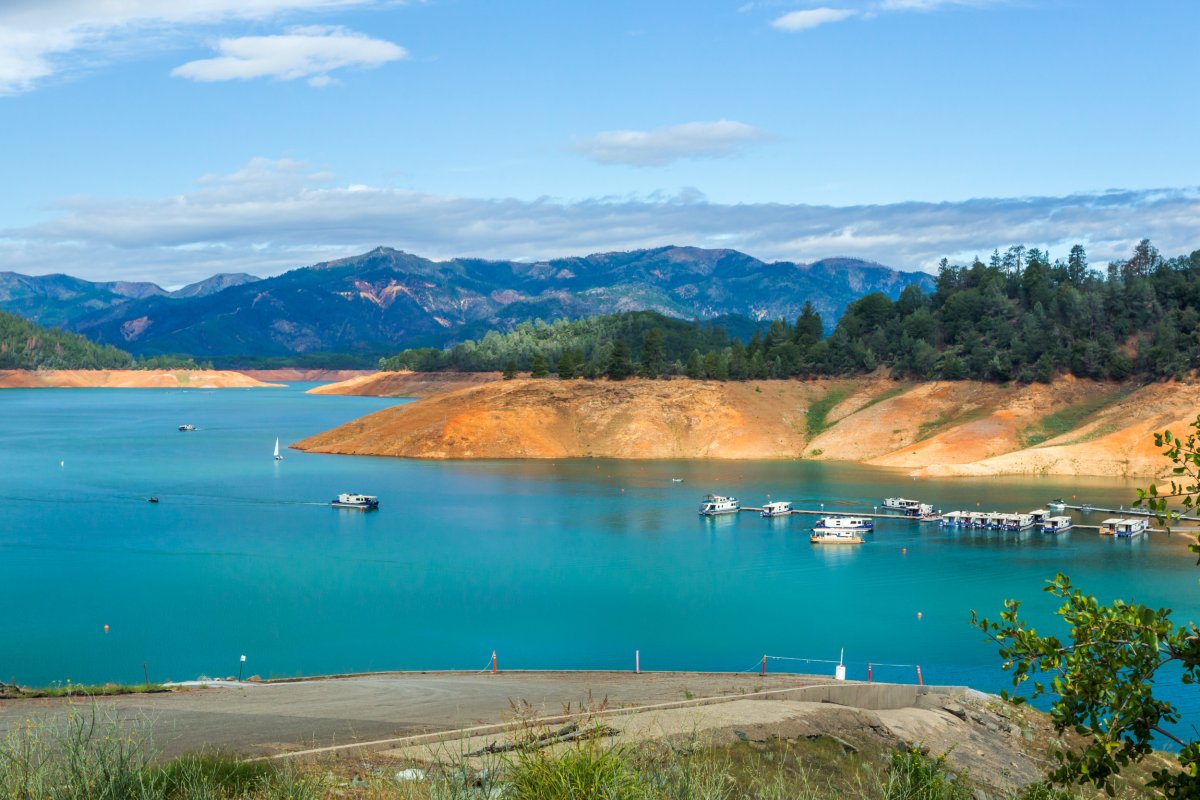A historic amount of rain fell on California between December 26 and January 19 and as a result many of the state's reservoirs have seen rising water levels.
Most of California is still in the grips of a drought that has lasted for two decades and water levels in its reservoirs remain well below their historical average. However, the recent rain was so heavy that parts of the state changed their drought status— 97.93 percent of California is still experiencing drought, but the remaining 2.07 percent is classified as "abnormally dry."
California's reservoirs provide storage for water supply, and reduce flooding as a result. The water comes from winter and spring rainfall and snowpack running down through the mountains. That water is then used for irrigation and in municipalities.

There is ongoing concern about these reservoirs as weather patterns are unpredictable and many are drying up faster than they can be replenished.
So what do California's reservoirs look like now?
The state's largest reservoir, Shasta Lake in Shasta County, has seen a huge increase in water levels as a result of the recent heavy rains. On December 26, when the rains began, the lake was at 921.08 feet. Levels rose throughout January and as of February 2 the lake is at 987.93 feet.
In February 2022, the lake's elevation was at 934.14 feet, marking a 53-foot difference between now and the same period last year.
The lake is still well below its average elevation—when it is full, its water levels reach 1067 feet—but the rising water level is good news for the state.
California's second-largest reservoir by volume, Lake Oroville, north of Sacramento, saw water levels rise from 673 feet on December 26 to 810.38 feet on February 2—another dramatic increase.
The table below shows how much the state's 15 largest lakes have risen since the recent heavy rainfall began.
| Lake | Water Level (ft MSL) 12/26/22 | Water Level (ft MSL) 01/09/23 | Water level (ft MSL) 02/02/23 |
| Shasta Lake | 921 | 942 | 987.92 |
| Lake Oroville | 673 | 735 | 810.38 |
| Trinity Lake | 2,189 | 2,204 | 2,226.36 |
| New Melones Lake | 883 | 908 | 941.19 |
| San Luis Reservoir | 412 | 430 | 479.39 |
| Don Pedro Reservoir | 737 | 765 | 784.15 |
| Lake Berryessa* | 394 | 401 | 412.1 |
| Lake Almanor | NA | NA | NA |
| Folsom Lake | 386 | 406 | 416.52 |
| Lake McClure | 676 | 735 | 800.47 |
| Pine Flat Lake | 766 | 801 | 857.11 |
| New Bullards Bar Reservoir | 1,861 | 1,890 | 1,915.53 |
| Diamond Valley Lake | NA | NA | NA |
| Lake Tahoe | 6,223 | 6,224 | 6,224.32 |
| Lake Havasu | 447 | 448 | 447.64 |
Source: Lakes Online *Lake Berryessa data from Solano County Water Agency
Experts have warned that while the downpours had been welcome, it would take a lot more precipitation to address the ongoing water shortage.
"So far the rainfall in the northern Sierra Nevada, which our largest reservoirs depend on, is at about 40 percent of the annual average," Roger Bales, a water and climate engineer at the University of California, Merced, previously told Newsweek. "We need more precipitation, closer to the average, to refill the reservoirs. We need two to three more big storms in January-March."
Do you have a tip on a science story that Newsweek should be covering? Do you have a question about drought? Let us know via science@newsweek.com.
Uncommon Knowledge
Newsweek is committed to challenging conventional wisdom and finding connections in the search for common ground.
Newsweek is committed to challenging conventional wisdom and finding connections in the search for common ground.
About the writer
Robyn White is a Newsweek Nature Reporter based in London, UK. Her focus is reporting on wildlife, science and the ... Read more
To read how Newsweek uses AI as a newsroom tool, Click here.








